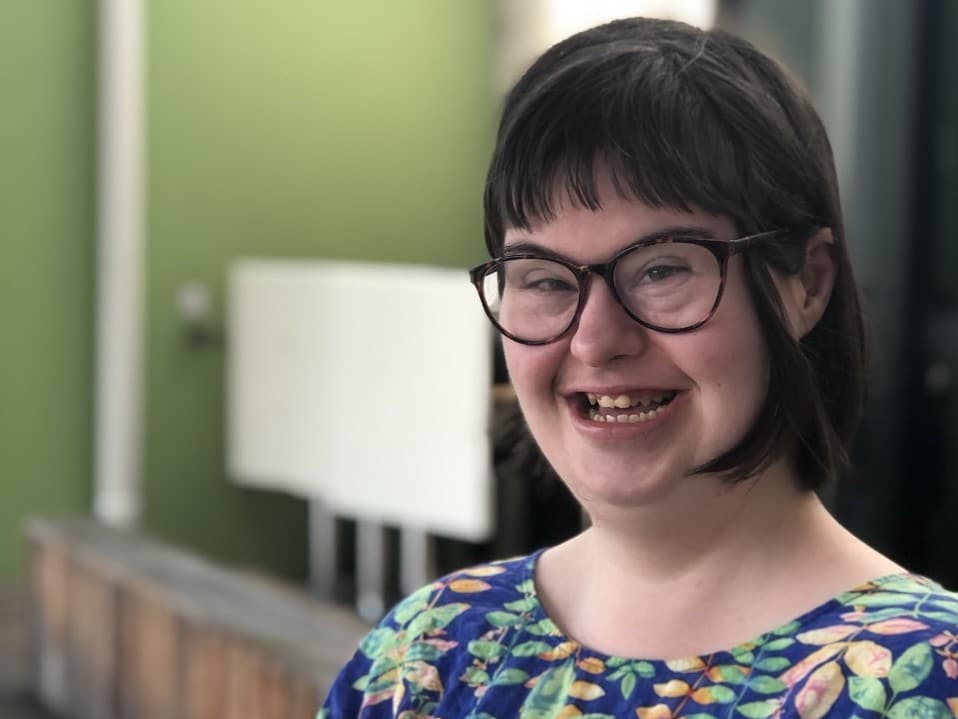
Adding value with Down syndrome
The 26-year-old Emma Lynam lives with Down syndrome and, with the support of NDIS carers, she has started her own business, moved into her own home and is living the life she wants.
Emma loves her Saturday morning Zumba fitness classes, she looks forward to meeting with her business networking group Beers Down on a Friday afternoon, and she’s keen to travel to Japan or New Zealand again when COVID-19 restrictions lift.
Emma, who lives with Down syndrome, doesn’t read or write but she has a photo board which acts as her calendar to provide her with the necessary prompts for her busy daily schedule in her home town of Townsville.
Over the past few years, 26-year-old Emma has started a business, moved into her own place, and has been a sought-after speaker at disability conferences.
With the help of NDIS supports, Emma’s independence, confidence and life skills have grown daily – her mother, Jo, is “very proud” of her daughter’s achievements and capacity to live the life she wants.
Business is booming
In 2015, Emma started her own business – Master Shredder – disposing of confidential documents for local businesses. She began with one client, and now has more than 30 customers.
The business, which is in Emma’s name, operates as a mobile operation so she can travel to each client’s place of work.
Emma’s NDIS support carers start at 6.30am on their rostered days, where they work with Emma to clean up, make lunch, and help her prepare for the working day. At 8.30am, a support worker drives Emma and her shredder to her first job.
“The NDIS support has been life-changing for me,” Emma says. “While it’s true my little business was up and running before I had NDIS support, it was my mum who supported me in those early days.
“Having funding meant I could have a staff member, not mum work with me. That single thing has been so helpful – it has allowed me to grow in confidence. It has also helped me to become more independent as I don’t feel I have to have mum with me all the time.”
At first, Emma says, she wasn’t too sure about leaving the family home.
“But once I moved, I really liked it. I have now been in my own home since July, 2018, and I really love my home.”
After receiving supports in the evening, she is now fully independent every night of the week.
Jo says the growth in her daughter’s confidence has been “amazing”.
“She’s taking responsibility and it’s driven by her, not me. If I’m at her house she’ll say, ‘You can get going now. I can do this.’”
Jo says the NDIS funding has meant Emma can have a smartphone for her business and a Microboard to help her with communication.
Supports around her home have included assistance so Emma can learn to shop, cook and clean for herself.
“They are important skills,” Jo says. “Now, she can go in a cab by herself to the shops and come back by herself. She started with a support worker going with her and they taught her how to do it herself.”
“The funding has had a huge impact on Emma’s life.”
Jo says it’s important to remember that the NDIS is “there for us” and it benefits all Australians as the money boosts our local economies.
Jo has published a book – ‘An Angel At My Door’ – about her journey with her daughter Emma and their experiences of living with Down syndrome.
Through her public presentations, Emma has also shared her story starting with her birth – after which she required major bowel surgery – and moving on to her school years which were “challenging”.
In 2019, Emma was asked to speak at a disability expo in Christchurch, New Zealand, and she’s also recently spoke at the Feros Care Townsville Self-Employment Expo.
During the presentations, Emma uses Pictello, an application for her iPad which can create visual stories to share. Her iPad is connected to an overhead projector and speaker and Emma is able to communicate with her audience through pictures, diagrams, and speech which she types in to accompany the visuals.
“This is one of the areas where my life and confidence have really grown and it is a bit of a surprise to me. The first time I was asked to present in front of a group of people I was very uncomfortable. But now I really like it,” she says.
As a youth councillor, Emma has also presented her story to the Human Rights Commission of Queensland – the moral of her story being that people with a disability “add value”.
Jo says a key component of Emma’s message is the significance of Social Role Valorization (SRV), which stems from a person’s ability to have a valued role in society which can include paid work and volunteering.
Now, through employment, Emma has a ‘valuable role’ in society.
“I’m a big fan,” Jo says. “ That’s Emma’s compass for her life. If you give people a valuable role, you change the view of the people around them. You change how they are viewed.”
Next, Emma would love to be an extra in a movie or commercial and she’s currently applying for work in this field.
“And I would really like to go on a holiday again.”